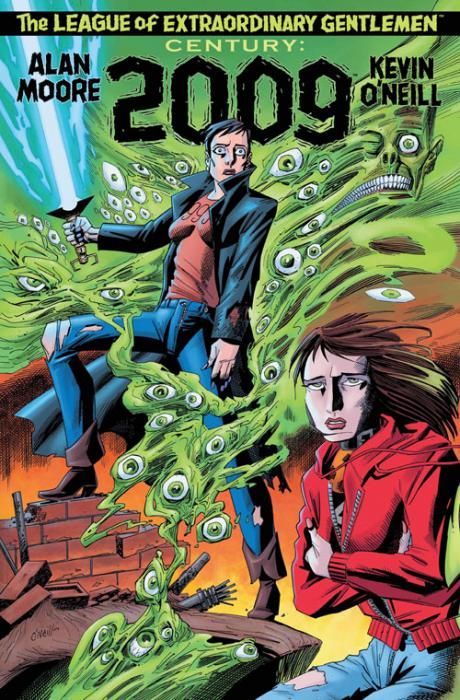"League of Extraordinary Gentlemen: Century 2009" brings the third volume of Alan Moore and Kevin O'Neill's "League of Extraordinary Gentlemen" series draws to a close -- and what a close. It might not be as experimental as "The Black Dossier" or as instantly accessible as the first two volumes, but the completed "Century" sits happily alongside the previous League volumes as arguably one of the greatest comics of all time.
It's impossible to fully articulate the level of genius at work here. Moore's script and O'Neill's artwork are as close to perfect as any comics team has ever managed. Not content with being technically brilliant, the creative team manages to find new ways to use the comics form. Quite simply, this story couldn't be told in any other way than as a comic, and that's a criteria that too few comics manage to fulfill.
The second installment, "Century 1969", left what remained of the League in a dark place. "2009" picks up 40 years later, with the situation no better. With the antichrist rising and the League ill-equipped to prevent it despite having a century to prepare, it's left to Orlando, the gender-swapping immortal and the League's most recent inductee, to get things back on track by any means necessary.
Because "2009" serves as the third act to a complete series, rather than a stand-alone piece of work, it's by far the most enjoyable installment. Every plot strand weaved over the last two years suddenly unravels, every house of cards built up is knocked down. The (superficial) identity of the anti-Christ may have already been revealed in news stories across the web, but wait until you learn who shows up to help stop him. A character as audacious as it is hilarious.
The shift to a more modern setting gives a more dangerous air to the use of various characters and concepts, but the gaps in exposition are expertly chosen so that the reader can fill them in. Even so, this is a comic that could never have been published by a company like DC. If the shrouded appearance of James Bond got them worried enough to prevent exportation of "The Black Dossier," imagine how they'd feel about the inclusion of a character made famous by Disney.
Of course, there's a lot more going on here than the simple reference-packed pulp-adventure that characterized earlier League stories. This is the first time that the comic has been able to illustrate its wider point so effectively: that stories change the world. It's ground that has been similarly covered in Mike Carey's "Unwritten," but Moore takes a far subtler approach, using it as the undercurrent to his League works rather than the central point.
By the time of Century 2009 -- our time, lest we forget -- the stories have become poisonous. Creations are lacking in inspiration and merit, and worst of all, they're out of control, threatening to consume the landscape around them. Even the "good" stories have been ravaged by the world. There's no happy ending to be found here, just an ending and the promise of more grimness to come in a world that can't cope with its own changes.
But in the end, "Century 2009" reminds us that "League" isn't just a story: it's all stories; a romance-horror-comedy-satire-polemic-parody to inspire and inform. At a time when Moore's opinions are being analyzed and dissected so publicly, it's worth remembering that whether you agree with him or not, he remains one of the most talented writers ever to grace the medium. And that's one thing that can't be taken away from him.

